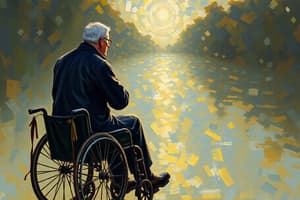Podcast
Questions and Answers
What is the earliest time Bill wakes up every day?
What is the earliest time Bill wakes up every day?
- 4:45 (correct)
- 5:30
- 5:00
- 6:00
What does Bill typically do during his lunch break?
What does Bill typically do during his lunch break?
- Sit on a bench near Saint Thomas More Church (correct)
- Visit friends in the area
- Eat at a local diner
- Continue working without breaks
How has Bill's work schedule changed over the years?
How has Bill's work schedule changed over the years?
- He extends his work hours into the evening. (correct)
- He has changed jobs completely.
- He starts work earlier than before.
- He now works fewer hours.
What is a consistent part of Bill's evening routine?
What is a consistent part of Bill's evening routine?
Which transportation does Bill use to reach his sales territory?
Which transportation does Bill use to reach his sales territory?
What routine does Bill prefer for his frozen dinners?
What routine does Bill prefer for his frozen dinners?
Why was Bill concerned when towels were folded incorrectly?
Why was Bill concerned when towels were folded incorrectly?
What aspect of technology did Bill adapt to quickly?
What aspect of technology did Bill adapt to quickly?
What is Bill’s attitude towards modern gadgets in general?
What is Bill’s attitude towards modern gadgets in general?
What was the reason Bill did not initially want a computer?
What was the reason Bill did not initially want a computer?
How does Bill prefer to consume information during sports broadcasts?
How does Bill prefer to consume information during sports broadcasts?
What does Bill enjoy about his frozen dinner preparation process?
What does Bill enjoy about his frozen dinner preparation process?
What motivated Bill to postpone his back surgery initially?
What motivated Bill to postpone his back surgery initially?
What significant financial decision did Bill make that negatively impacted his situation?
What significant financial decision did Bill make that negatively impacted his situation?
How did the narrator and her husband plan to help Bill with his financial problems?
How did the narrator and her husband plan to help Bill with his financial problems?
What was the outcome of Bill's back surgery?
What was the outcome of Bill's back surgery?
Which phrase best describes Bill's attitude towards taking sick days?
Which phrase best describes Bill's attitude towards taking sick days?
What was the narrator's initial reaction to Bill's accident?
What was the narrator's initial reaction to Bill's accident?
What lesson did Bill ultimately learn after years of working despite his pain?
What lesson did Bill ultimately learn after years of working despite his pain?
What motivated Bill to resume work after his surgery?
What motivated Bill to resume work after his surgery?
What impact did Bill's health condition have on his personal finances?
What impact did Bill's health condition have on his personal finances?
What was the public's reaction to Bill's return to activities after his surgery?
What was the public's reaction to Bill's return to activities after his surgery?
What event occurred shortly after the filming of Bill's story by ABC's 20/20?
What event occurred shortly after the filming of Bill's story by ABC's 20/20?
What was Bill's attitude towards change regarding delivery days?
What was Bill's attitude towards change regarding delivery days?
How did the narrator feel when Bill was late returning home?
How did the narrator feel when Bill was late returning home?
What information did the stranger provide about Bill's accident?
What information did the stranger provide about Bill's accident?
What was the immediate concern for Bill after being hit by the car?
What was the immediate concern for Bill after being hit by the car?
What was the reaction of the children while waiting at the hospital?
What was the reaction of the children while waiting at the hospital?
What did the hospital staff find necessary after examining Bill?
What did the hospital staff find necessary after examining Bill?
Why did the narrator feel the situation was surreal when hearing about Bill's accident?
Why did the narrator feel the situation was surreal when hearing about Bill's accident?
Flashcards
Bill's daily routine
Bill's daily routine
A highly structured daily schedule Bill follows for over 30 years, including specific times for waking up, eating, work, and resting.
Bill's sales territory
Bill's sales territory
Bill's designated work area in the West Hills of Portland, where he visits potential customers.
Bill's lunch routine
Bill's lunch routine
Precisely scheduled lunch break at 1:30 PM, in a specific location.
Bill's extended workday
Bill's extended workday
Signup and view all the flashcards
Bill's evening routine
Bill's evening routine
Signup and view all the flashcards
Bill's preference for traditional methods
Bill's preference for traditional methods
Signup and view all the flashcards
Bill's aversion to answering machines
Bill's aversion to answering machines
Signup and view all the flashcards
Bill's view on VCRs
Bill's view on VCRs
Signup and view all the flashcards
Bill's relationship with microwaves
Bill's relationship with microwaves
Signup and view all the flashcards
Bill's appreciation for routine
Bill's appreciation for routine
Signup and view all the flashcards
Bill's preference for personalized interaction
Bill's preference for personalized interaction
Signup and view all the flashcards
Bill's resistance to computers
Bill's resistance to computers
Signup and view all the flashcards
Bill's accident
Bill's accident
Signup and view all the flashcards
Hospital confusion
Hospital confusion
Signup and view all the flashcards
Unexpected errands
Unexpected errands
Signup and view all the flashcards
Author's worry
Author's worry
Signup and view all the flashcards
Delivery directions
Delivery directions
Signup and view all the flashcards
Accidental Delay
Accidental Delay
Signup and view all the flashcards
Hospital transfer
Hospital transfer
Signup and view all the flashcards
Social Services Referral
Social Services Referral
Signup and view all the flashcards
Author's frantic reaction
Author's frantic reaction
Signup and view all the flashcards
Bill's Financial Crisis
Bill's Financial Crisis
Signup and view all the flashcards
Bill's Back Surgery
Bill's Back Surgery
Signup and view all the flashcards
Financial Aid to Bill
Financial Aid to Bill
Signup and view all the flashcards
Renting Bill's House
Renting Bill's House
Signup and view all the flashcards
Family Financial Risk
Family Financial Risk
Signup and view all the flashcards
Bill's Successful Recovery
Bill's Successful Recovery
Signup and view all the flashcards
Post-Surgery Sales
Post-Surgery Sales
Signup and view all the flashcards
Difficulties With Phone Sales
Difficulties With Phone Sales
Signup and view all the flashcards
Unexpected Financial Risk
Unexpected Financial Risk
Signup and view all the flashcards
Study Notes
Bill Porter's Routine and Resilience
- Bill Porter, a sales representative, maintains a highly structured daily routine spanning over 30 years.
- This routine includes specific times for waking, dressing, breakfast, reading the newspaper, listening to the weather, and getting to his sales territory in the West Hills of Portland.
- He adheres to a strict 8-hour workday, taking a lunch break at 1:30 p.m., often near Saint Thomas More Church.
- Evening routine involves reviewing orders, dinner with his mother, and listening to a radio talk show or sports event.
- Bill ends the day with a hot bath before bed.
Bill's Adaptability and Resistance to Change
- Bill's routine is intensely rigid, often resisting modern conveniences.
- He initially refused to adopt various technological gadgets like answering machines, VCRs, microwaves, cable TV, and cordless phones, preferring personal contact.
- He viewed gadgets as unnecessary obligations rather than helpful tools.
- His preference for face-to-face interactions is a key aspect of his selling style.
- He only accepts new technology as a gift or when it is crucial for his work.
Bill's Challenges and Triumphs
- Bill experienced a significant setback when he suffered a fractured hip in a car accident.
- He also faced financial difficulties with high-interest debt and potential home foreclosure.
- Bill's friends, Shelly and John, helped him through his financial struggles, securing a loan to pay off his debt.
- Bill's health insurance was cancelled, further complicating matters, and after surgery, he was initially advised for extensive care in an adult-care facility, but his resolve allowed him to adapt and return to his territory through phone sales.
Bill's Determination and Persistence
- Bill's stubborn determination is evident in his refusal to give up his door-to-door sales lifestyle.
- He adjusted sales strategy to phone calls when required by physical health issues
- He returns to his previous selling style and remains successful even after being critically injured and having a long period of restricted activity, proving his adaptability.
Shelly's Role in Bill's Life
- Shelly, a longtime friend, plays a significant supportive role in Bill's life, attending to his needs and helping him navigate his challenges.
- Shelly's close friendship is a crucial aspect of Bill's resilience during his illness
- She helps Bill with deliveries, adapting to his schedule when his physical health prevents him from managing his routine. Shelly's love and concern for Bill help him to recover and adapt to his injuries
Studying That Suits You
Use AI to generate personalized quizzes and flashcards to suit your learning preferences.





